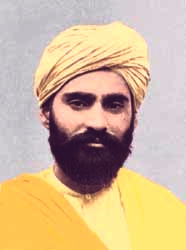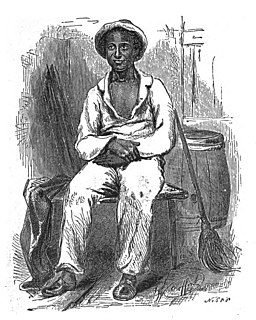A Quote by Ralph Waldo Emerson
It is a mischievous notion that we are come late into nature; that the world was finished a long time ago. As the world was plastic and fluid in the hands of God, so it is ever to so much of his attributes as we bring to it. To ignorance and sin, it is flint. They adapt to themselves to it as they may; but in proportion as a man has anything in him divine, the firmament flows before him and takes his signet and form.
Related Quotes
Christianity exhorted man to set himself up against Nature, but did so in the name of his spiritual and disinterested attributes. Pragmatism exhorts him to do so in the name of his practical attributes. Formerly man was divine because he had been able to acquire the concept of justice, the idea of law, the sense of God; today he is divine because he has been able to create equipment which makes him the master of matter.
The world is full of men who want to be right, when actually the secret of a man's strength and his pathway to true honor is his ability to admit fault when he has failed. God wants to fill the church with men who can say they are wrong when THEY ARE WRONG. A man who is willing to humble himself before God and his family and say: "I was wrong." will find that his family has all the confidence in the world in him and will much more readily follow him. If he stubbornly refuses to repent or admit he was wrong, their confidence in him and in his leadership erodes.
According to the technical language of old writers, a thing and its qualities are described as subject and attributes; and thus a man's faculties and acts are attributes of which he is the subject. The mind is the subject in which ideas inhere. Moreover, the man's faculties and acts are employed upon external objects; and from objects all his sensations arise. Hence the part of a man's knowledge which belongs to his own mind, is subjective: that which flows in upon him from the world external to him, is objective.
That world beyond is a world of sanctity and radiance; therefore, it is necessary that in this world he should acquire these divine attributes. In that world there is need of spirituality, faith, assurance, the knowledge and love of God. These he must attain in this world so that after his ascension from the earthly to the heavenly Kingdom he shall find all that is needful in that eternal life ready for him.
When a man sought knowledge, it would not be long before it could be seen in his humbleness, his sight, upon his tongue and his hands, in his prayer, in his speech and in his disinterest (zuhd) in worldly allurements. And a man would acquire a portion of knowledge and put it into practice, and it would be better for him than the world and all it contains - if he owned it he would give it in exchange for the hereafter.
I judge a man by his actions with men, much more than by his declarations Godwards - When I find him to be envious, carping, spiteful, hating the successes of others, and complaining that the world has never done enough for him, I am apt to doubt whether his humility before God will atone for his want of manliness.
What a man does, that he has. What has he to do with hope or fear? In himself is his might. Let him regard no good as solid but that which is in his nature, and which must grow out of him as long as he exists. The goods of fortune may come and go like summer leaves; let him scatter them on every wind as the momentary signs of his infinite productiveness.
If an enthusiastic, ardent, and ambitious man marry a wife on whose name there is a stain, which, though it originate in no fault of hers, may be visited by cold and sordid people upon her, and upon his children also: and, in exact proportion to his success in the world, be cast in his teeth, and made the subject of sneers against him: he may, no matter how generous and good his nature, one day repent of the connection he formed in early life; and she may have the pain and torture of knowing that he does so.
Instead of replying, Alec reached down and took Magnus's hands. Magnus let Alec pull him to his feet, a questioning look in his eyes. Before he could say anything, Alec drew him closer and kissed him. Magnus made a soft, pleased sound, and gripped the back of Alec's shirt, rucking it up, his fingers cool on Alec's spine. Alec leaned into him, pinning Magnus between the table and his own body. Not that Magnus seemed to mind. 'Come on,' Alec said against Magnus's ear. 'It's late. Let's go to bed.
A man who fears not God, will break all his laws with an easy conscience, but one who is the favorite of heaven, who has been indulged to sit at royal banquets, who knows the eternal love of God to him, cannot bear that there should be any evil way in him that might grieve the Spirit and bring dishonor to the name of Christ. A very little sin, as the world calls it, is a very great sin to a truly awakened Christian.
God, Who is by nature good and dispassionate, loves all men equally as His handiwork. But He glorifies the virtuous man because in his will he is united to God. At the same time, in His goodness he is merciful to the sinner and by chastising him in this life brings him back to the path of virtue. Similarly, a man of good and dispassionate judgment also loves all men equally. He loves the virtuous man because of his nature and the probity of his intention; and he loves the sinner, too, because of his nature and because in his compassion he pities him for foolishly stumbling in darkness.
At such times, the heart of man turns instictively towards his Maker. In prosperity, and whenever there is nothing to injure or make him afraid, he remembers Him not, and is ready to defy Him; but place him in the midst of dangers, cut him off from human aid, let the grave open before him, then it is, in the time of his tribulation, that the scoffer and unbelieving man turns to God for help, feeling there is no other hope, or refuge, or safety, save in his protecting arm.








































